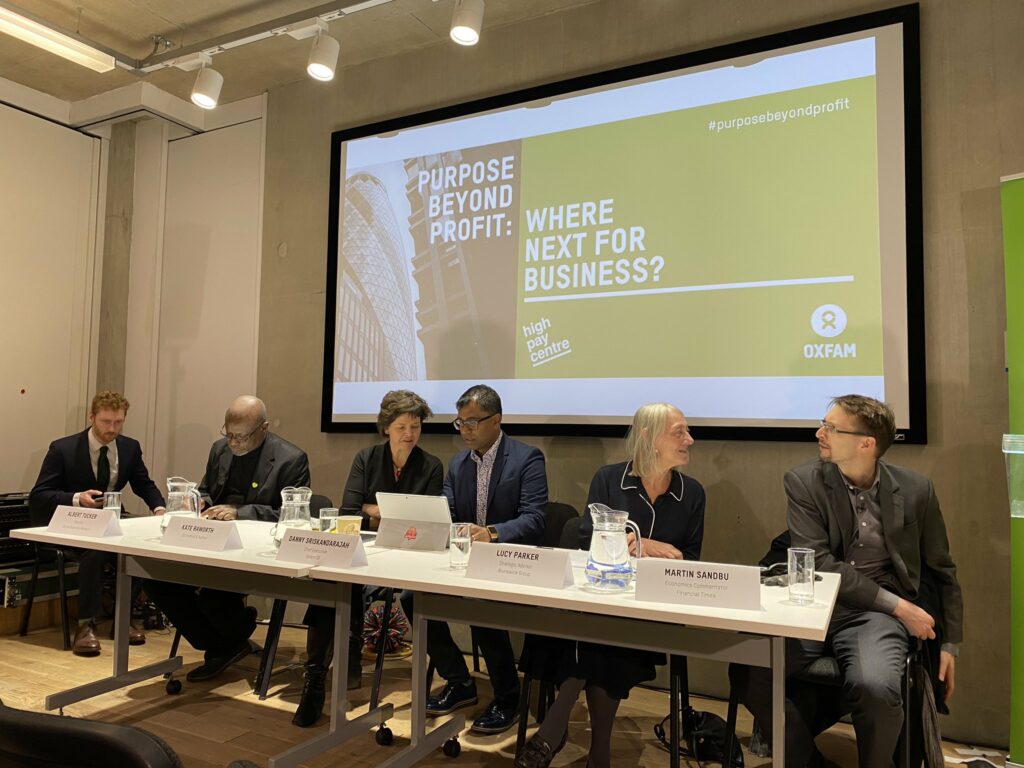
Posted 27th February 2020
Last night Social Value UK attended Oxfam and High Pay Centre‘s Purpose Beyond Profit: Where Next for Business panel event in London, bringing together professionals across all sectors to discuss and dissect the current market in which we all operate in, and whether it is sustainable and should be overruled.
Panellists consisted of:
Kate Raworth, renegade economist and creator of the Doughnut of social and planetary boundaries exploring the economic mindset needed to address the 21st century’s social and ecological challenges.
Martin Sandbu, Financial Times European Economics Commentator, who has been writing about economics for the FT since 2009, when he joined the paper as Economics Leader Writer. He now also writes the FT’s Free Lunch.
Lucy Parker, co-author of ‘Everybody’s Business: the unlikely story of how big business can fix the world.’ She is a strategic advisor at the Brunswick Group, working with senior leadership in business.
Albert Tucker, a leading figure in the fair trade movement, community regeneration and sustainable development. A trusted advocate for poorer small scale farmers in global trade and policy, he has a strong track record in leading and building successful social enterprises and farmer to market supply chains.
Luke Hildyard, Executive Director, High Pay Centre will open the event and Danny Sriskandarajah, Chief Executive of Oxfam GB, chaired the discussion.

Luke Hildyard opened with a talk on the need for corporate policies to tackle poverty and climate change, in a way that isn’t interpreted in a manner that is attacking business. Furthermore, as we tackle issues around shareholder and profit primacy, we must remember that CEOs of large corporates don’t walk into work every day thinking about how they can damage the environment and punish the poor, but the status quo does, and we must involve business in fixing business practice.
Danny Sriskandarajah recognised that the end of poverty is only possible if we have a fundamental change in the way the economy, works, and we must understand that the phrase purpose is divisive and can be used in a purpose washing manner.
Kate Raworth discussed that we know that business has a role in solving the environmental and societal crisis, after seeing the 20th-century’ extractive by design’ business model. She gave 5 design traits which define business:
1) Purpose
2) Networks
3) Governance
4) Ownership
5) Finance
Lucy Parker recognised that we are at a tipping point of this ‘shareholder first’ business model, but we don’t know what exactly will come next. We need to shift the business-focused short term perspective and change it to a longer-term focus, within which we recognise how we can live within the confines of this planet’s resources and longevity. From her experience, CEOs will recognise the need to include creating social value as well as financial value, but few know how to actually do this.
Martin Sandbu brought with him a copy of the first-ever issue of the Financial Times, showing that the FT has always, since 1888, had a focus on holding businesses to account and recognising their wider purpose beyond profit. Now, in 2020, he recognises that their readers are desiring more than just stories on financial gain, they wish to see the wider activities of a business. He also discussed his apprehension of the phrase purpose, as he’d rather see businesses with less defined purposes that do more good, than others.
Albert Tucker discussed taking away the element of ethics and just looking directly at whether a business creates damage to the planet or not, and that we have all forgotten the purpose of business- to serve people! Not the other way around. Albert recognised the need to change the business environment, the only reason we do business the way we do now is because it’s incentivised, if this ‘way’ of capitalism wasn’t the most profitable, it wouldn’t be what was done.
Discussion dove into capitalism and the ‘isms’ of the 20th century, with many panellists discussing that saving or transforming capitalism isn’t the need for us right now, the need is to create a new form of business, why should we be saving something which has had it’s meaning changed and warped over the years so that most people recognise it as different things? Why not start fresh, with a new progressive business model, one which does recognise the purpose, people and planet over profit.
Social Value UK is proud to have launched the How Do Companies Act? initiative to tackle many of these issues, to reflect the modern playing field of business and accountancy, and to change the way the world values people and planet. Read more here.
The event can be watched here.
